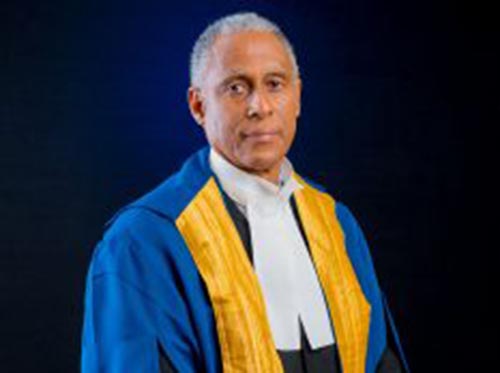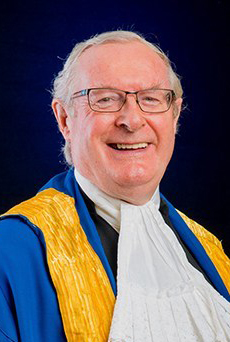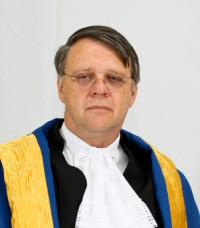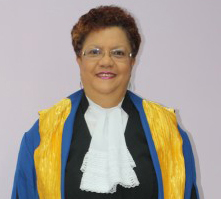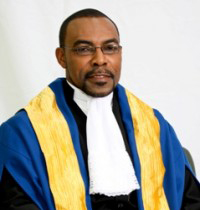The Caribbean Court of Justice (CCJ) yesterday ruled that the no-confidence motion brought against the David Granger-led APNU+AFC administration was validly passed with the votes of 33 members of the 65-member National Assembly last December, thereby compelling the resignation of Cabinet and the holding of general elections.
Justice Jacob Wit—one of the five judges who presided over the appeals—said no magic was needed in determining what constituted the needed majority, while noting that attorneys for the state sought to work what he called “their legal magic,” with which they succeeded in persuading the local appellate court that a minimum of 34 votes constituted the majority that was required.
In addition to discrediting the 34-majority argument, the Trinidad-based court of last resort for Guyana also dismissed government’s contention that the vote of APNU+AFC defector Charrandass Persaud was invalidated by his dual citizenship, which disqualified him as a Member of Parliament (MP).
Following the delivery of the summary of the court’ judgments yesterday morning by CCJ President Justice Adrian Saunders, who did so in under an hour in Port-of-Spain, the court has slated a hearing for next Monday for the parties to decide among themselves the consequential orders to be made. They were also urged by the court to agree on costs to be paid.
The court has, however, made it clear that while it intends to have the parties agree on consequential orders, it will intervene and make the necessary orders, if they are unable to arrive at any consensus.
Senior Counsel Eamon Courtenay, one of government’s attorneys, had sought to ascertain from the court, the possibility of directing the opposition party to prepare and submit to the government a draft of the orders it intends the court to make.
Justice Saunders, however, made it clear that the court was not interested in rehearing the case, while noting that the findings of the court were final and definitive. The judge said it is only the desire of the court, at this stage, for the parties to agree on the consequential orders, to which it will then give effect.
Justice Saunders said the court does not want to insert itself into that process, but prefers to give the parties a chance to arrive at agreement on their own as to the way forward given the rulings of the court. As Justice Wit put it, “we are hoping for a happy marriage between principle and practicality.”
The three matters heard and consolidated by the CCJ were filed by attorney Christopher Ram, who had argued that the motion against government had been validly passed and therefore elections became due; private citizen Compton Reid, who contended that Persaud ought to have been disqualified from voting as he was an MP in violation of the constitution, because of his dual citizenship; and Opposition Leader Bharrat Jagdeo, who opposed government’s contention that 34 votes, and not 33 votes, were required on the motion, for its collapse.
The motion, sponsored by Jagdeo, was declared passed by Speaker of the National Assembly, Dr Barton Scotland following the vote in its favour by then APNU+AFC parliamentarian Persaud on the night of December 21st, tipping the scales in favour of the motion, 33 in favour.
Though initially accepting passage of the motion, the government, through Attorney General and Legal Affairs Minister Basil Williams, subsequently did an about face, arguing that the majority needed for the motion to have been considered passed was 34 and not 33, which it contended was an “absolute” majority and not merely a “simple” majority.
Following a challenge by government in the High Court, Chief Justice (Ag) Roxane George found that even though Persaud was made a parliamentarian in violation of the Constitu-tion, his vote was valid and that the motion was validly passed. She also ruled that the passage of the motion should have triggered the immediate resignation of the Cabinet.
The Guyana Court of Appeal, by a majority decision on March 22nd, overturned the Chief Justice’s ruling, saying that the correct mathematical formula for finding the “absolute” majority was not used. While Chancellor Yonette Cummings-Edwards (Ag) and Justice of Appeal Dawn Gregory agreed that 34 votes were required for the motion to be carried, Justice of Appeal Rishi Persaud dissented.
‘Without merit’
In his reading of the CCJ’s summary judgment yesterday, Justice Saunders said the court decided that the requirement of “a majority of all the elected members of the National Assembly” referred to a majority of the total number of votes or seats in the Assembly, irrespective of the number of members who actually voted.
He said in determining that majority, the court was of the opinion that the “half plus one” rule was not applicable, while stating emphatically that “the majority was clearly at least 33 votes.”
Justice Saunders explained that since Guy-ana’s National Assembly comprised an odd-number of persons, when all the members of the Assembly are present and vote, all that is necessary is to determine whether the motion has garnered “the majority of all the elected members.”
“Such a majority, in the court’s view, was clearly at least 33 votes,” he declared.
Williams and the battery of attorneys representing the government had repeatedly argued that in order to arrive at the “absolute” majority, the framers of the constitution could only have meant at least half of the 65 members of the House, plus one, which necessitated rounding up to 34.
However, Chief Justice George had said that a careful examination of the case law on which the Attorney General was seeking to rely, did not in any way help him, but rather nullified government’s calculation before adding that Article 106 (6) makes no reference to fractions, and therefore does not require an application of the principle of rounding up.
“If all 65 members are present and voting, a majority of those members present and voting is 33,” the judge had noted, before adding that in the case of the requirement of a majority of all elected members, at least 33 votes would always have to be obtained.
The Chief Justice’s findings, unlike that of the majority ruling of the local appeal court, found favour with the CCJ.
Article 106 (6) states, “the Cabinet including the President shall resign if the Government is defeated by the vote of a majority of all the elected members of the National Assembly on a vote of confidence.
Further, 106 (7) adds, “Notwithstanding its defeat, the Government shall remain in office and shall hold an election within three months, or such longer period as the National Assembly shall by resolution supported by not less than two-thirds of the votes of all the elected members of the National Assembly determine, and shall resign after the President takes the oath of office following the election.”
Justice Wit, in his separate judgment concurring with the rest of the bench, said that while the issue of the majority attracted a lot of attention, he thought it to be the simplest of them all.
The judge said that the eminent lawyers representing the government, “worked their legal magic” in the court below and succeeded in persuading the majority of the Court of Appeal that a majority of a total of 65 seats under Article 106 (6) of the Constitution must be 34 against 31 instead of 33 against 32.
“It is very clear, however, that this is not and cannot be right as the President (of the CCJ) has demonstrated with the solid reasoning in his judgment. The answer to the question—what is a majority in a parliament of 65 members?—could be very short,” Justice Wit said.
“I would simply use the words of Justice Potter Steward of the US Supreme Court who, defining obscenity, famously stated: “I know it when I see it.” In the same vein, I know a majority when I see it; if one side has one vote more than the other, that is a majority, a narrow one but still a majority. And no magic is needed,” he added.
In his concurring judgment, Justice Winston Anderson, who also heard the appeals before the CCJ, described government’s contention that the motion was not carried by a vote of 33 to 32 as being “wholly untenable and without merit.”
No petition
As regards Persaud being a dual citizen—due to him possessing Canadian citizenship—and whether this would have made him ineligible to vote, the CCJ noted that citizens with dual nationality are not allowed to put themselves up for candidacy in elections to the National Assembly.
Notwithstanding this, however, the court found that the National Assembly (Validity of Elections) Act required that a petition alleging that Persaud was disqualified from running for office would have had to have been filed in the High Court within 28 days after the publication of the results of the 2015 general election.
Since the litigation was filed only in January of this year, however, the CCJ held that the challenge to Persaud’s election to the National Assembly had been out of time.
Addressing the issue as to whether the court had jurisdiction to enquire into Persaud’s disqualification from being a member of the National Assembly, Justice Saunders noted that historically, disputes over the qualification of members to Legislative Assemblies were not triable by the courts, but were instead determined in the Assemblies themselves.
He said that such matters, however, eventually became entrusted to the courts.
The court said it has long been recognised that the elections petition procedure was intended to be an exclusive one and held that it had no jurisdiction to consider the question of the validity of a member’s election to House by any other means.
With the 28-day period having expired, Justice Saunders said that the court lacked the jurisdiction to enquire into whether Persaud was disqualified at the time of his election to the National Assembly.
The judge, however, pointed out that Persaud’s disqualification clearly arose before he became a member of the House and he had already been recalled and removed from the National Assembly on January 3rd of this year—the day before these legal proceedings were initiated.
Having concluded that the court lacked jurisdiction to impeach Persaud’s election, Justice Saunders said the court found that there was no real need to ascertain whether Article 165 (2) preserved the validity of his vote.
The judge went on to highlight, however, that even if the court did have jurisdiction to declare Persaud’s election to the National Assembly to have been void from the outset, it agrees with the court’s below that Article 165 (2) would have in any event, preserved the validity of his vote.
Political price
The court also rejected the submission that Persaud was absolutely required to vote against the motion of no confidence along with other members of the government.
Justice Saunders noted from Justice Wit’s judgment, that while the Constitution contained provisions that prevented members from ‘crossing the floor’ and gave the representative of each list—both government and opposition—the power to recall and replace a member, those provisions could not, and were not meant to prevent members from voting.
On the question of whether Persaud could validly vote on the motion against his list, despite not having declared in writing in advance that he would not support the list, Justice Maureen Rajnauth-Lee in her separate judgment, agreeing with the rest of the court, observed that, “the member who votes against his list no doubt risks paying the ultimate political price and can be recalled in accordance with the provisions of the Constitution. We were told that on 3rd January 2019, Mr Persaud was indeed recalled and replaced. That is the consequence which the Constitution permits.”
Having regard to the judgment, Justice Rajnauth-Lee said she urges all to bear in mind that the rule of law is an important guiding constitutional principle of a sovereign democratic state like Guyana, and that the provisions of the constitution must be upheld in accordance with the rule of law.
Article 156 (3) (a) states, “A member of the National Assembly elected on a List shall cease to be a member of the Assembly, if –he or she declares in writing to the Speaker or to the Representative of the List from which his or her name was extracted that he or she will not support the List from which his or her name was extracted.”
The CCJ also rejected Reid’s contention that Persaud was absolutely required to vote against the motion along with other members of the government to which he belonged, unless the party’s whip granted permission for a “so-called conscience vote.”
Justice Saunders said it was the finding of the court that nothing in Article 156 (3) or anywhere else in the constitution prohibited Persaud from voting against the government on any particular measure.
Such a vote, the judge said, may well cause the representative of his list to remove him from the Assembly but clarified that “his vote will still be valid.”
Addressing the issue as to whether there was a distinction between a “vote of confidence” and a “vote of no-confidence,” Justice Saunders said that this was unimportant and just amounted to a matter of linguistic difference, denoting different sides of the same coin.
Against this backdrop, the court found that there was nothing in the article preventing a member of the opposition from moving a motion of no-confidence against the government.
Government had argued that there was a fundamental difference between a motion of confidence and a motion of no-confidence, the latter of which it contended the opposition could not mount against it.
The CCJ, however, rejected these arguments noting that, that article gave effect to the fundamental principles of responsible or accountable government for it to resign when it no longer enjoyed the confidence of the Parliament.
Having regard to its findings, the CCJ held that the National Assembly properly passed the motion and that the provisions of Article 106 (6) and (7) were accordingly triggered. Justice Wit is noted in the judgment as saying that the amendments of 2000 which introduced the provisions sought to “bring Guyana back from an authoritarian presidential regime to a more democratic one.”
The appeals were heard at the seat of the court by Justices Saunders, Rajnauth-Lee, Anderson, Wit and David Hayton.
